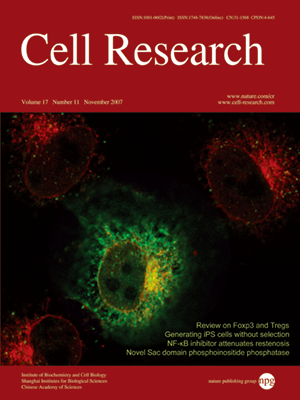
Volume 17, No 11, Nov 2007
ISSN: 1001-0602
EISSN: 1748-7838 2018
impact factor 17.848*
(Clarivate Analytics, 2019)
Volume 17 Issue 11, November 2007: 933-941
ORIGINAL ARTICLES
Andrographolide inhibits NF-κB activation and attenuates neointimal hyperplasia in arterial restenosis
Yu-Jiu Wang1,*, Jin-Tao Wang2,*, Quan-Xin Fan1 and Jian-Guo Geng2
1Department of Cardiac Surgery, Shandong Provincial Hospital, Shandong University, Jinan 250021, China
2Laboratory of Molecular Cell Biology, Institute of Biochemistry and Cell Biology, Shanghai Institutes for Biological Sciences, The Graduate School of Chinese Academy of Sciences, Chinese Academy of Sciences, Shanghai 200031, China
Correspondence: Jian-Guo, Geng(genglab@gmail.com)
The NF-κB transcription factors modulate the expression of tissue factor (TF), E-selectin (CD62E) and vascular cell adhesion molecule-1 (VCAM-1), which are essential for thrombosis and inflammation. We have previously shown that andrographolide (Andro) covalently modifies the reduced cysteine
62 of p50 – a major subunit of NF-κB transcription factors, thus blocking the binding of NF-κB transcription factors to the promoters of their target genes, preventing NF-κB activation and inhibiting inflammation
in vitro and
in vivo. Here we report that Andro, but not its inactive structural analog 4H-Andro, significantly suppressed the proliferation of arterial neointima (κ60% reduction) in a murine model of arterial restenosis. Consistently,
p50-/- mice manifested attenuated neointimal hyperplasia upon arterial ligation. Notably, the same dosage of Andro did not further reduce neointimal formation in
p50-/- mice, which implicates the specificity of Andro on p50 for treating experimental arterial restenosis. The upregulation of NF-κB target genes, including TF, E-selectin and VCAM-1, and the increased deposition of leukocytes (mainly CD68
+ macrophages) were clearly detected within the injured arterial walls, all of which were significantly abolished by treatment with Andro or genetic deletion of
p50. The expression of TF, E-selectin and VCAM-1 was also markedly upregulated in the patient sample of thrombotic vasculitis, indicating the clinical relevance of NF-κB activation in the pathogeneses of occlusive arterial diseases. Our data thus indicate that, by the downregulation of the NF-κB target genes that are critical in thrombosis and inflammation, specific inhibitors of p50, such as Andro, may be therapeutically valuable for preventing and treating thrombotic arterial diseases, including neointimal hyperplasia in arterial restenosis.
Cell Research (2007) 17:933-941. doi: 10.1038/cr.2007.89; published online 16 October 2007
FULL TEXT | PDF
Browse 1895


